In today's fast-paced digital landscape, organizations are racing to stay ahead by embarking on transformative journeys that promise innovation, efficiency & enhanced customer experiences. It's the era of digital transformation & it's more critical than ever before. But as the saying goes, "With great power comes great responsibility." While the potential rewards of digital transformation are immense, so are the challenges that lie ahead.
From technology hurdles to cultural shifts, the challenges in digital transformation are both diverse & formidable. But fear not, for in this blog, we'll delve deep into the top 5 challenges that organizations encounter in their quest for digital transformation excellence.
More Read- The top tech trends to watch for in 2024
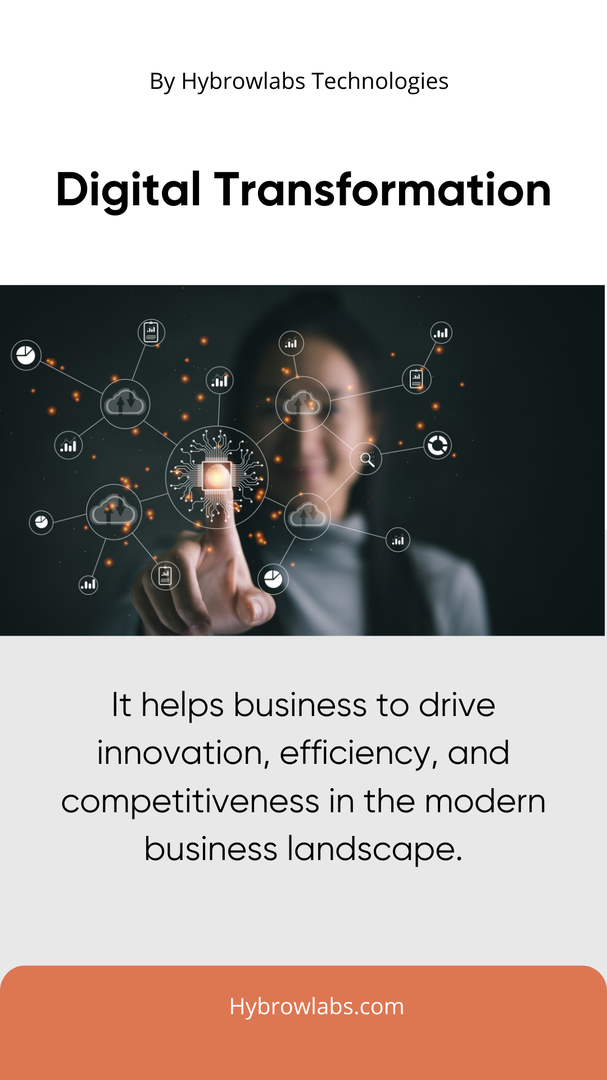
Understanding Digital Transformation:
Before we delve into the challenges, let's understand what it mean by "digital transformation." At its core, digital transformation is the methodological use of digital technologies to fundamentally change the way organizations work, provide value to customers & stand against in the market. It's a seismic shift from traditional business models to ones that are fast, data-driven & customer-centric. To get a piece of complete information about Digital Transformation you can read our previous blog- Navigating Digital Transformations Success.
The Acceleration of Technology:
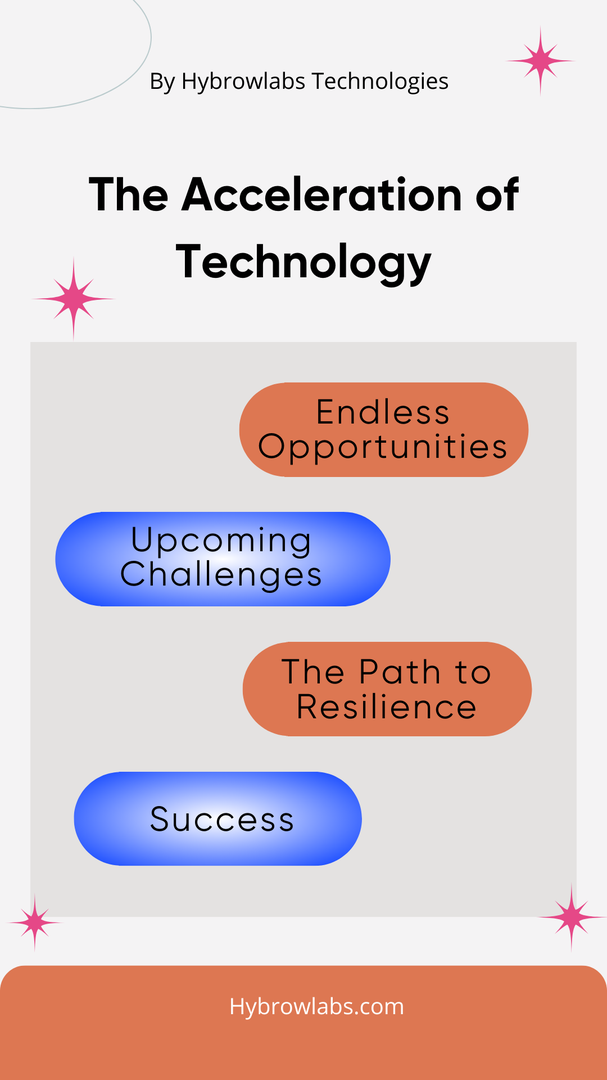
In the grand scheme of human history, the pace at which technology is advancing today is nothing short of breathtaking. The digital landscape is in a constant state of evolution, where groundbreaking innovations of yesterday can easily become obsolete in the blink of an eye. This relentless surge in technological advancement presents a two-sided coin of both unprecedented opportunities & formidable challenges & it compels businesses to not only keep up but to navigate this digital tsunami with remarkable agility to remain relevant.
1. Endless Opportunities:
The ever-accelerating march of technology proposes a lot of opportunities for those who dare to assume it. Businesses have at their disposal a wealth trove of cutting-edge tools & solutions that can streamline operations, improve customer experiences & unlock new revenue streams. The possibilities are endless, from harnessing the power of artificial intelligence for predictive analytics to leveraging blockchain for secure & transparent transactions. Those who adjust swiftly can ride the wave of newness to acquire new heights of triumph.
2. Upcoming Challenges:
The rapid evolution of technology also poses formidable challenges that demand strategic foresight & proactive measures. The potential for disruption is ever-present, as established business models can crumble in the face of digital disruptors. Moreover, the pressure to remain at the forefront of technological innovation can be overwhelming, both in terms of investment & talent acquisition. Navigating this uncharted territory requires a keen understanding of the digital landscape & a willingness to continually reassess & adjust.
3. The Path to Resilience:
In this era of digital transformation, adaptation is not a choice; it's an imperative. Businesses must adopt a mindset of perpetual learning & innovation. They must be willing to shed outdated practices & embrace new paradigms to thrive in this era of unprecedented change. It's not merely about staying afloat; it's about riding the crest of the digital wave & leading the charge toward a future where technology is harnessed to its fullest potential.
Top 5 Challenges in Digital Transformation Projects:
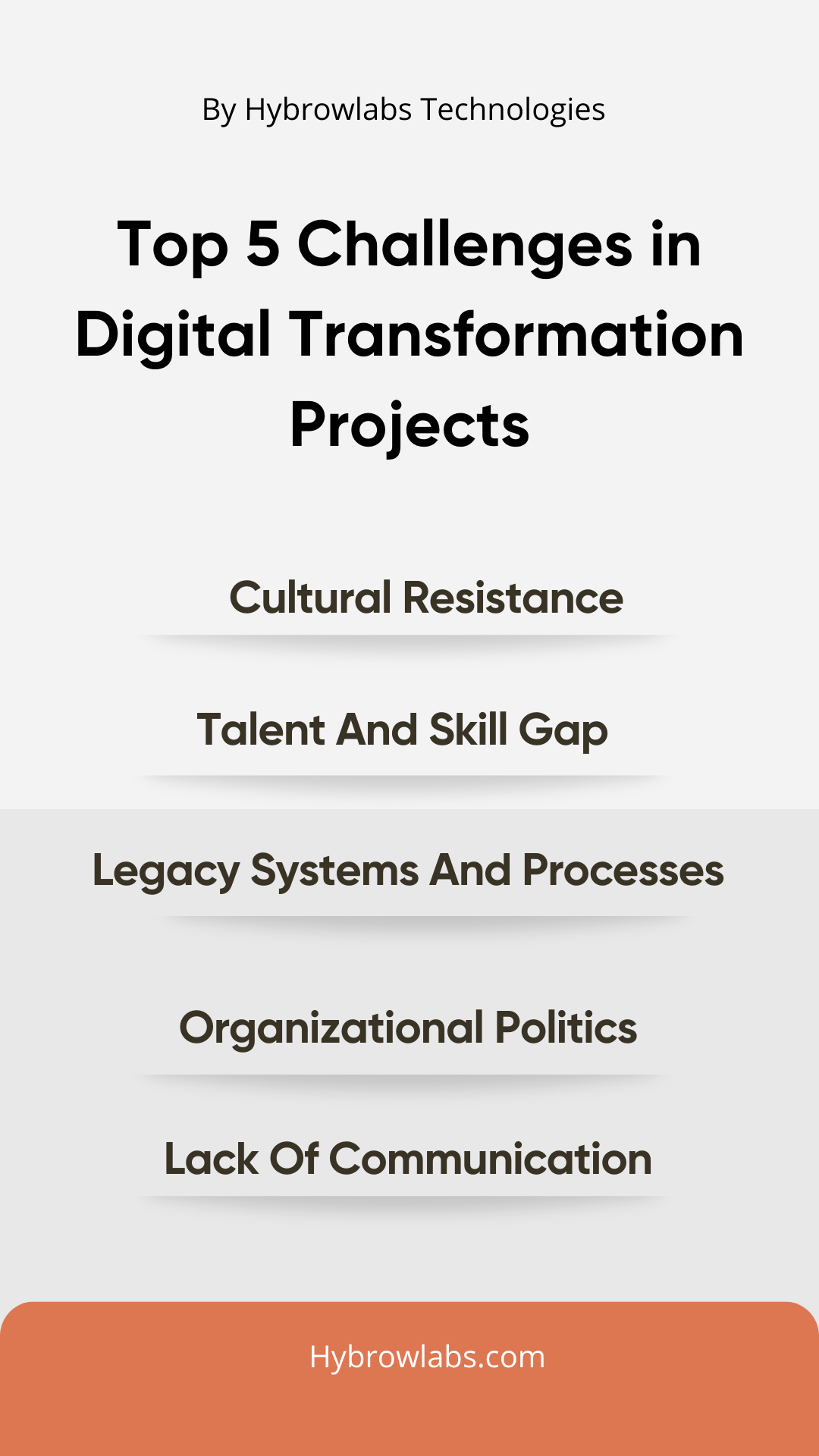
Challenge- 1: Cultural Resistance:
Many times, employees resist change due to fear, uncertainty, or a lack of comprehension regarding the benefits of the proposed digital transformation. When we specifically examine cultural resistance, it can often be rooted in a deeply ingrained culture that resists change or prefers traditional methods. Frequently, this can manifest as tribal knowledge or an employee strongly attached to manual processes or the notorious spreadsheet. This can pose a significant challenge & result in a lack of buy-in from employees or resistance from the critical middle management tier responsible for executing the new technological processes or changes within the organization. This, in turn, can hinder progress.
Change is hard & the cultural shift required for successful digital transformation can be met with resistance from employees, especially in well-established organizations. Fear of job displacement or unfamiliar technology can hinder progress. Digital transformation isn't just about technology; it's about people. Often, employees are resistant to change, fearing job displacement or struggling to adapt to new digital tools. This cultural resistance can hinder the adoption & success of transformation initiatives.
Solution: Fostering a digital-friendly culture is vital. Organizations should promote open communication channels, provide comprehensive training & create a safe space for employees to voice concerns. Encouraging employees to be digital champions can help overcome resistance. Show employees how digital tools can empower them rather than threaten job security.
Challenge- 2: Talent And Skill Gap:
Often, we aim to redefine what training means, transitioning from traditional methods like PowerPoints or instructional videos that solely demonstrate the functional aspects of using new technology, to a more holistic approach. This new approach involves building a relationship & fostering a positive perception with employees, highlighting the underlying benefits of how the technology will improve their jobs. Frequently, this challenge stems from a perception of a deficiency in the skills or expertise required to adapt to the new technology or methods. Consider this: when any new technology is involved in your life, whether it's a new smartphone or a new way of using a social media platform, it takes time to grasp & often, it can be quite frustrating if you don't know how to effectively use the new technology.
There is a growing demand for professionals with expertise in popular technologies like AI, IoT & blockchain. Organizations often struggle to get & retain the right talent to execute their digital transformation strategies.
Solution: Bridge the skill gap through training, partnerships with educational institutions, or outsourcing specific tasks to experts. Leverage Hybrowlabs' expertise to fill in the skill gaps & access a pool of seasoned professionals.
Challenge- 3: Legacy Systems And Processes:
Resistance frequently emerges when current legacy systems & processes are deeply rooted & perceived as effective, making it difficult to welcome new technologies. There's a fear of disrupting established workflows or dependencies on outdated systems that can significantly impede the adoption of digital solutions. Additionally, resistance may emanate from IT departments or system administrators who have invested considerable time in maintaining these legacy systems. This can make it a complex & delicate matter, especially when dealing with tribal knowledge, legacy system maintenance & the effort invested in creating customizations.
Solution: One of the key hurdles in digital transformation is dealing with deeply ingrained legacy systems & processes. These systems are often viewed as effective, which can breed resistance to adopting new technologies. The fear of disrupting established workflows & the substantial investments in maintaining these legacy systems can create a delicate situation. To navigate this challenge, organizations can take a gradual approach, integrating new technologies incrementally while preserving critical elements of legacy systems. Involving IT teams in the transition & offering training can help bridge the gap, demonstrating how digital solutions can enhance existing processes without causing disruption.
Challenge- 4: Organizational Structure And Politics:
Resistance can also be rooted in the organizational structure & internal politics within a company. This often obstructs collaboration & the cross-functional alignment essential for a successful digital transformation. In many cases, when a business is contemplating or undergoing a digital transformation, implementation failures occur due to siloed departments or business units that are reluctant to share data or cooperate in the pursuit of an integrated digital solution. This resistance typically arises from fears related to changes in power dynamics, shifts in job roles, or concerns about losing control.
Solution: To address resistance stemming from organizational structure & politics, start with leadership alignment & transparent communication. Create cross-functional teams, offer incentives for collaboration, & empower change champions. Develop a clear governance structure, invest in employee training & implement a comprehensive change management plan. Set measurable goals, consider external expertise, establish a continuous feedback loop & promote cultural evolution. By combining these strategies, organizations can break down silos & navigate internal politics to achieve a successful digital transformation.
Challenge- 5: Misinformation-Lack Of Communication & Planning:
The primary & foundational concept we're addressing here is fear, which often arises from the unknown & that unknown is typically a result of an incomplete communication plan. A communication plan isn't just an email; it should be a comprehensive strategy outlining how you intend to communicate the new technology, process, or any implementation throughout the entire organization. This plan needs to be deliberate & include measurable metrics to ensure that the message is effectively reaching & resonating within your organization.
Solution: To overcome challenges related to misinformation & a lack of communication planning in digital transformation, prioritize transparency & a well-structured communication strategy. Fear often stems from the unknown, which can be alleviated through clear communication. Develop a comprehensive communication plan that outlines how information will be disseminated throughout the organization, incorporating measurable metrics to gauge effectiveness & resonance. You can minimize misinformation & build confidence in the transformation process by keeping everyone informed & engaged.
Digital Transformation In The Future:
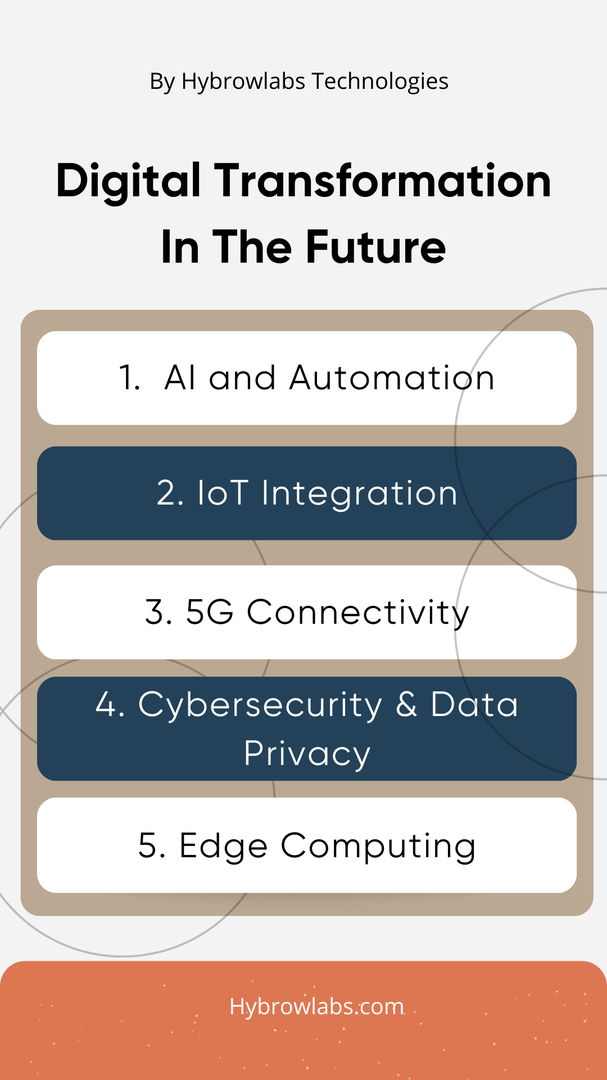
The future of digital transformation promises to be a dynamic & transformative journey, filled with exciting opportunities & profound changes. Here are some key trends & insights into the future of digital transformation:
1. AI and Automation:
Artificial Intelligence (AI) & automation will continue to play a central role in optimizing processes, enhancing customer experiences & enabling data-driven decision-making. This will lead to increased efficiency & productivity.
2. IoT Integration:
The Internet of Things (IoT) will expand its reach, connecting an ever-growing number of devices & systems. This will open up new possibilities for real-time data analysis, predictive maintenance & smart, interconnected environments.
3. 5G Connectivity:
The widespread adoption of 5G technology will enable faster, more reliable connections, supporting the growth of IoT, augmented reality (AR), virtual reality (VR) & other bandwidth-intensive applications.
4. Cybersecurity and Data Privacy:
As digital ecosystems grow, cybersecurity will be of paramount importance. Ensuring the security & privacy of data will be an ongoing challenge & a critical focus for organizations.
5. Edge Computing:
Edge computing will gain prominence as organizations seek to process data closer to its source, reducing latency and improving real-time decision-making. This will be crucial for applications like autonomous vehicles & remote monitoring.
Conclusion:
In the ever-evolving landscape of digital transformation, challenges are bound to arise, but with innovation & the right partners by your side, overcoming these hurdles is not only possible but also transformative. At Hybrowlabs, we're here to help you navigate the top five challenges of digital transformation & turn them into opportunities for growth, efficiency & success. Together, we'll pave the way to a brighter digital future. Embrace the change & let's venture on this journey together!
FAQ:
What are the common challenges in digital transformation?
Common challenges include technological integration, cultural resistance, data management & security, talent and skill gaps & scalability, and agility issues. These challenges can vary in complexity & impact depending on the organization's size and industry.
How can organizations overcome resistance to digital transformation?
Overcoming resistance requires clear communication, leadership alignment, employee training, change management strategies & a commitment to fostering a culture of innovation. It's crucial to address the human aspects of change and provide support throughout the transformation journey.
What are the benefits of digital transformation?
Benefits include increased efficiency, enhanced customer experiences, improved data-driven decision-making, cost savings, competitive advantage & the ability to adapt to market changes quickly. It also positions organizations for future growth & innovation.
How long does a digital transformation typically take?
The duration of a digital transformation varies widely depending on the organization's size, scope of change & complexity. It can range from several months to several years. The key is to focus on achieving meaningful milestones along the way.
What are some examples of successful digital transformations?
Examples include companies like Amazon, which transformed from an online bookstore into a global e-commerce & technology giant & Netflix, which shifted from DVD rentals to a digital streaming powerhouse. Many industries, including healthcare, finance & manufacturing, have also seen successful digital transformations.



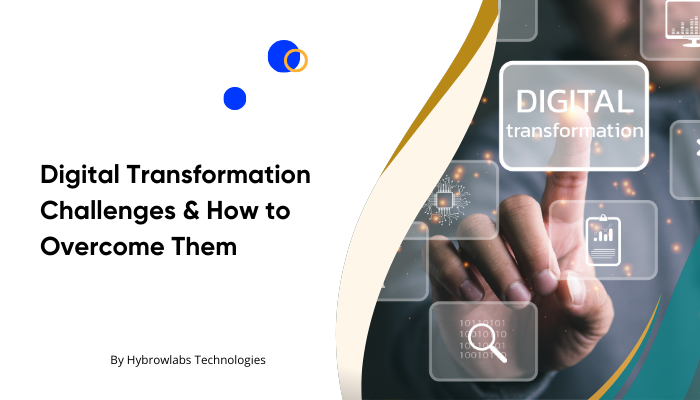


a3dc85.jpg)

.jpg)
fd8f11.png)

.jpg)
.jpg)